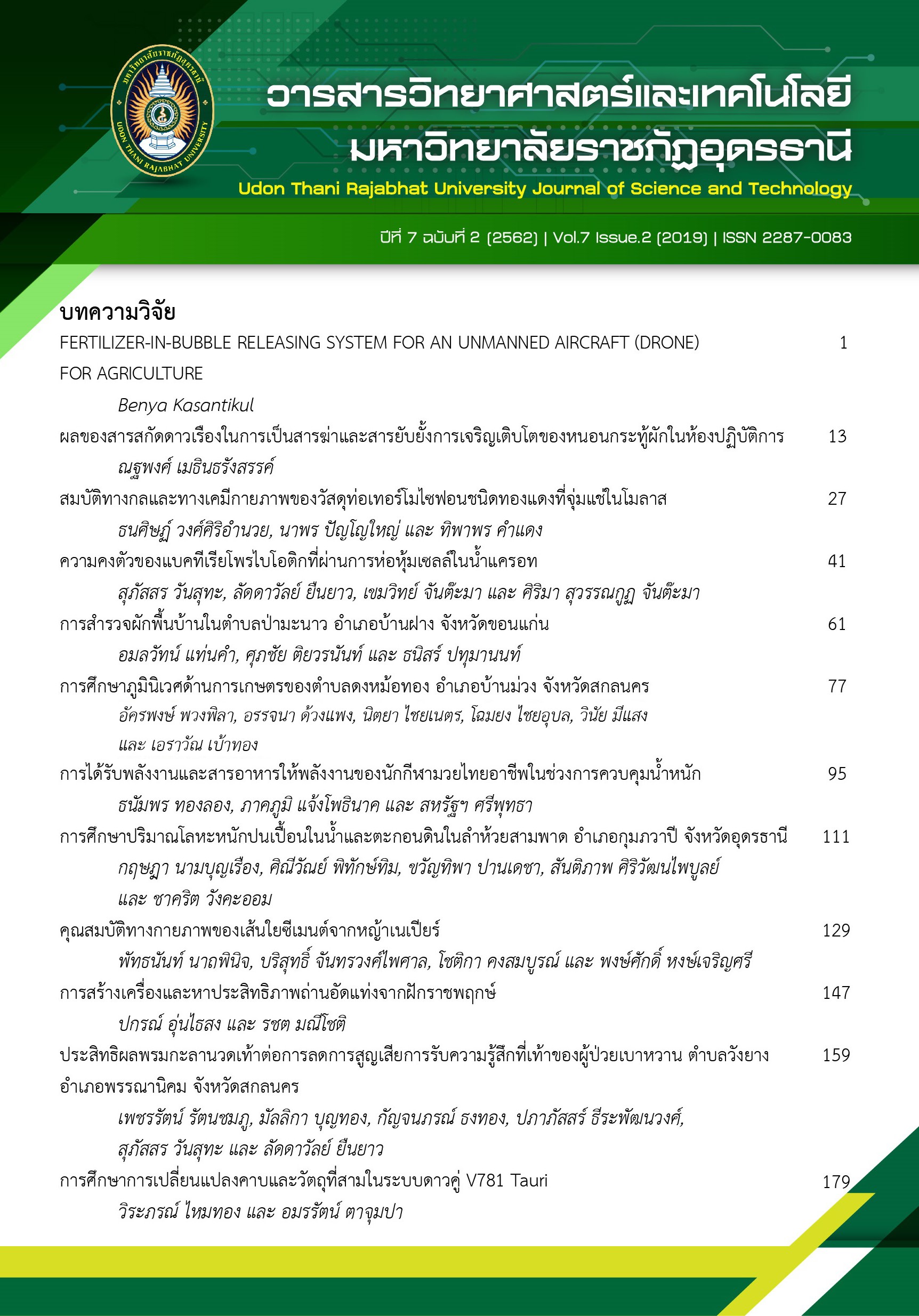ENERGY AND MACRONUTRIENTS INTAKE OF PROFESSINAL MUAY THAI ATHLETES DURING WEIGHT CONTROL
Main Article Content
Abstract
The purposes of this research were to study and to compare energy and macronutrients intake between training and weight management sessions of professional Muay Thai athletes. The samples consisted of 15 male professional Muay Thai athletes aged 20 – 22 years old in S.Siriluk Muay Thai gym, Mueang District, Udon Thani province. A tree-day data collection process took place during January – May 2018. Records of the food consumed by participants in 24 hours were collected. These records were analyzed using INMUCAL – Nutrients version 3.1 The obtained data were analyzed for means, standard deviation, and t – test scores at the proposed statistical significant level of 0.05. The results were as follows: The average energy and nutrients that professional Muay Thai athletes consumed during training sessions was 3620 + 392 Kcal/day: which could be divided into 542 + 60 g/day carbohydrates; 101 + 11 g/day fat; and 137 + 16 g/day protein. While during the weight management sessions, an average energy was 2516 + 617 Kcal/day, which was divided into 233 + 79 g/day carbohydrates; 85 + 31 g/day fat; and 149 + 29 g/day protein. When comparing between energy and macronutrients intakes during training sessions with weight management sessions, it was found that the professional Muay Thai athletes managed the intakes by focusing on reducing the consumption of carbohydrates that resulted in the reduction of energy consumed each day and the differences were significant difference at the .05 level. The results reveal that Professional Muay Thai managed their weight management using diet controls. The emphasis was on reducing carbohydrate intake. This might affect the physical fitness and performance of the athletes.
Article Details
References
Bass, D. H. (1995). Your personal fitness trainer. California: Ziff-Davis.
Han, D.H., Hansen, P.A., Host, H.H., & Holloszy, J.O. (1997). Insulin resistance of muscle glucose transport in rats fed a high fat diet a reevaluation. Diabetes; 46:1761-7.
Iowa, S., Mori, K., & Sato, Y. (1996). Effects of meal frequency on body composition during weight control in boxer. SC. and J. Med. Sci. Sport, 6(5), 265 - 272.
Jompol, V. (2013). The research of consumer behavior and conducting of boxer before flighing: A case study in HuayKwang District, Bangkok. Master of Home Economics.
Kitboonchoo, K. (2014). Increase athletic performance with nutrition. Bangkok: O.S. Printing House.
Klaewkla, C. (2009). Nutrition of athletic and exercise. Bangkok: Printing of Chulalongkorn University.
Klaewkla, J. & Sangperm, P. (2007). Food consumption for body weight reduction prior to the competition among Thai Boxers. Int. J. Hyg. Environ. Health, 30(3), 88 – 97.
Liu, S., Baracos V. E., Quinney, H. A., & Clandinin, M. T. (1996). Dietary fat modifies exercise–dependent glucose transport in skeletal muscle. J. Appl. Physiol., 80, 1219-1224.
McMurry, R. G., Proctor, C. R., & Wilson, W. L. (1991). Effect of caloric deficit and dietary manipulation on aerobic and anaerobic exercise. Int. J. Sports Med, 12(2), 167-172.
Mettler, S. (2009). Protein for weight loss. Sport Nutrition Conference; Munich: 27-30.
Power, S. K., & Howley, E. T. (2004). Exercise Physiology: Theory and application to fitness and performance. 5th ed. New York: McGraw-Hill.
Roemmich, J. N., & Sinning, W. E. (1997). Weight loss and wrestling training: effects on nutrition growth, maturation, body composition, and strength.
J. Appl. Physiol, 82(6), 1751 – 1759
Rosholt, M. N., King, P. A., & Horton, E. S. (1994). High fat diet reduces glucose transporter responses to both insulin and exercise. AM. J. Physiol., 266, R95-R101.
Sapwarobol, S, Adisakwattana, S, Ngamukot, S, Sirikhanpong, S, and Maccinen, K. (2011). Nutrition for enhancing performance ability. Journal of Sports Science and Health. 12(1), 7 – 14.
Sport Science Bureau, (2005). Sports nutrition, theory to practice. Bangkok: Printing and shipping organization ware teaching aids.
Sriramatr, S. (2017). Principles of sports training for athletic trainers. Bangkok: Printing of Chulalongkorn University.
The Institute of Nutrition. (2016). User Guide INMUCAL – Nutrients V.3 Manual of INMUCAL. Nutrients V.3 Program. Edit 3.
Vaspan, C., & Charongsuk, R. (2008). Food for Health. Nakhon phatom: Silpakorn University.


